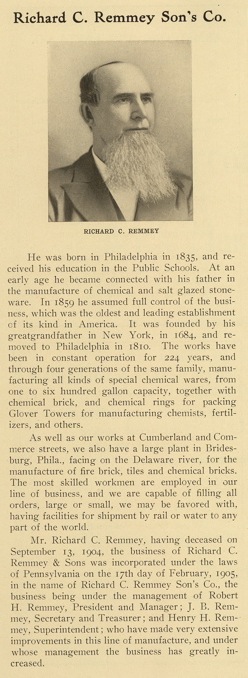Hedley Street at the Delaware River, Philadelphia PA 19137
© Jack J. Steelman,
Workshop of the
World (Oliver Evans Press, 1990).
The Remmey Refractory is
located on Hedley Street in Bridesburg. It borders the
Delaware River on the east, and the Philadelphia Belt
Line Railroad on the west. 1
The Remmey Refractory specialized in making fire brick;
however, it also produced other items associated with
boiler construction that had to withstand the heat of a
furnace (2,000-3,000 degrees F.). One of its largest jobs
was for U.S. Steel when the Fairless Hills plant was
constructed. Remmey erected all of the refractories
associated with the blast furnaces.
The company's origins are traced back to several brothers
who emigrated from France in 1870. They arrived in New
York, but soon moved to Philadelphia and began working at
a pottery-making firm owned by John T. Lewis, at
Cumberland and Thompson Streets in 1890. By 1900, they
all left Lewis and opened up a new business on Hedley
Street that also produced pottery. In 1910, Remmey was
awarded a lucrative contract with the Philadelphia Gas
Company, supplying firebrick for their new plant at Tioga
Street. After that, much of their business revolved
around steam plants throughout the area. As most
businesses required steam for heat and power, Remmey's
business flourished. Soon, their list of customers
included the Philadelphia Electric Company (for its
stations outside the area as well as in the city), major
hospitals, department stores, and many factories.
Remmey's plant was made up largely of five components:
the shops where the clay was formed and shaped, the kilns
where the clay was fired, 2
the warehouses
where the products were stored, the loading docks where
it was shipped, and the administrative offices.
In 1965, A.P. Green, a large manufacturing company of
related items, bought controlling interest in the Remmey
Refractory and soon took over operation of the plant.
They continued to produce brick until 1987, when the
facility shut down—the demand for steam having
steadily dwindled.
Presently, the plant is occupied by a recycling company
which only makes use of the warehouse and loading docks.
As of this writing, the kilns are still intact, although
non-functioning.
1 The Philadelphia Belt Line
Railroad was the former Reading Railroad freight spur to
the area.
2 Originally coal-fired, the
kilns were later converted to gas.
Update May
2007 (by
Joel Spivak):
Demolished.
